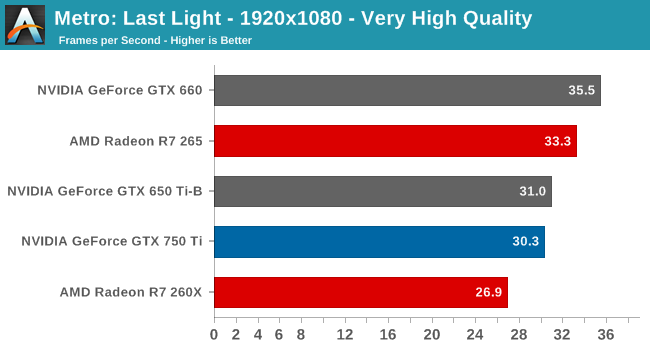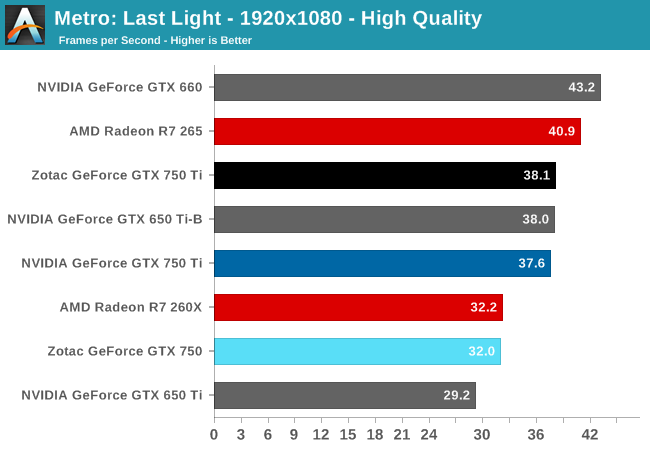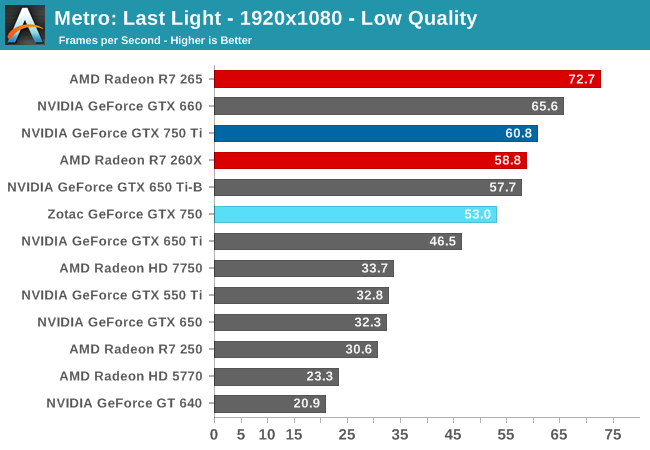The NVIDIA GeForce GTX 750 Ti and GTX 750 Review: Maxwell Makes Its Move
by Ryan Smith & Ganesh T S on February 18, 2014 9:00 AM ESTMetro: Last Light
As always, kicking off our look at performance is 4A Games’ latest entry in their Metro series of subterranean shooters, Metro: Last Light. The original Metro: 2033 was a graphically punishing game for its time and Metro: Last Light is in its own right too. On the other hand it scales well with resolution and quality settings, so it’s still playable on lower end hardware.



Diving into our performance analysis, we’ll be looking at a few different factors. On a competitive basis, the GTX 660 and the R7 265 are the GTX 750 Ti’s closest competitors. Though we’ll also want to compare it to GTX 650, so see what a GK107 versus GM107 matchup looks like. Meanwhile the GTX 750’s closest competitors will be the R7 260X, and to a lesser degree the GTX 650 Ti.
Being one of our more difficult games, Metro shows right off the bat that these mainstream video cards, no matter how fast they are, will face a difficult time. The GTX 750 Ti can stay comfortably above the 30fps at high quality, but the GTX 750 not so much.
What’s clear right off the bat two is two things. The first is that GTX 750 Ti, the GM107 flagship, is significantly faster than GTX 650, the GK107 flagship. GTX 750 Ti is just short of doubling GTX 650’s performance in this benchmark.
The second point is that neither GTX 750 series card is going to fare well against its AMD counterpart. Both the R7 265 and R7 260 are faster than the GeForce cards, and by over 10% at times.
Finally, GTX 750 Ti won’t be touching GTX 660 here. It’s close, but especially at higher quality settings the GTX 660 is pulling away. GTX 750 Ti can’t completely make up for the lack of memory bandwidth and ROP throughput.










177 Comments
View All Comments
Harry Lloyd - Tuesday, February 18, 2014 - link
20 nm Maxwell will be epic. Gimme.TheinsanegamerN - Tuesday, February 18, 2014 - link
Imagine. OCed Geforce 690 level performance, out of a single chip, with 8 GB of RAM on a 512 bit bus, pulling the same amount of power as a geforce 770. One can dream....ddriver - Tuesday, February 18, 2014 - link
LOL, epic? Crippling FP64 performance further from 1/24 to 1/32 - looks like yet another nvidia architecture I'll be skipping due to abysmal compute performance per $ ratio...JDG1980 - Tuesday, February 18, 2014 - link
This card is designed for gaming and HTPC. Only a tiny fraction of users need FP64.nathanddrews - Tuesday, February 18, 2014 - link
So I guess we'll have to wait for the 750TIB before we can see SLI benchmarks. Two of these would be within reach of 770 while using considerably less power. Hypothetically, that is.ddriver - Tuesday, February 18, 2014 - link
You do realize the high end GPUs on the same architecture will have the same limitation?Morawka - Tuesday, February 18, 2014 - link
I thought the higher end Maxwell cards will have Denver/aRM cores on the PCB as well.Mr Perfect - Wednesday, February 19, 2014 - link
It might be a software/firmware limitation though. From what the compute enthusiasts have said, the only difference between the Titan's full compute and 780Ti's cut down compute is firmware based. They've got the same chip underneath, and some people hack their 780s for full compute. They're probably doing the same thing with the Maxwell stack.chrnochime - Wednesday, February 19, 2014 - link
Got link for the hack? Sounds interesting.Mr Perfect - Thursday, February 20, 2014 - link
I don't myself, but if you're interested look up IvanIvanovich over at bit-tech.net. He was talking about vbios mods and resistor replacement tweaks that can do that.